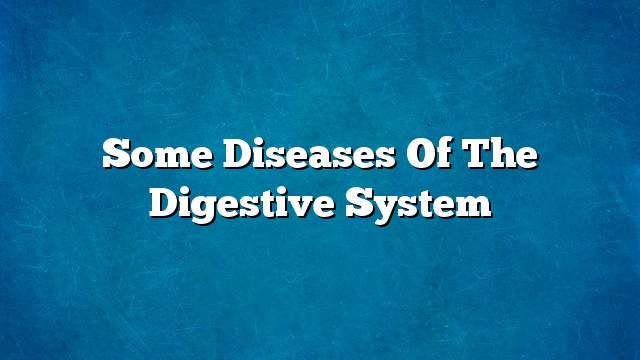Digestive
The gastrointestinal tract is a long, tortuous canal that begins from the mouth and ends with the anus. It is the body responsible for the digestion of food. It converts large food molecules into small absorbable and swallowing particles, thus nourishing the body and providing it with all its needs. Health, the digestive system may be exposed to many health problems and diseases, which we will know you in this article.
Diseases of the digestive system
Indigestion
Indigestion occurs for several reasons, including: eating unhealthy foods, stomach stress, difficulty chewing, or eating many snacks between the main meals, leading to gastric discomfort or over-consumption of caffeine-containing beverages, such as : Coffee and tea, which leads to irritation of the gastric membrane, and thus the occurrence of indigestion, noting that dental disorders, gums and nose lead to digestive disorder, and some other gastrointestinal problems, such as: gastric ulcer.
Peptic ulcers and streptococcus bacteria
Gastrointestinal ulcers are caused by Helicobacter pylori bacteria H.Pylori , Which leads to infection of the duodenal ulcer by 80%, gastric ulcers by 60%, or the long-term use of anti-inflammatory drugs, ulcers are treated with antibiotics, or by reducing the acidity of the stomach using medicines to reduce acidity of the stomach.
stomach cancer
Gastric cancer is one of the most common types of cancer. It is more likely to develop as a result of age or previous gastric ulcers, leading to signs of cancer on the body, such as weight loss, severe pain, and bleeding from time to time.
Constipation
Constipation causes many diseases such as liver function disorder, hemorrhoids, cerebral hemorrhage, anal fissures, heart attack, stomach bloating, headache, tongue change, which leads to gallbladder inflammation, liver congestion. To avoid constipation, Drink plenty of water, and eat fiber-rich foods.
Hemorrhoids
Hemorrhoids are common problems among many people, which are rectal veins in the rectum and anus, resulting from eating low amounts of foods high in fiber, coughing, or obesity, sitting or standing for long periods, pregnancy, or aging, Leading to bleeding in the anal region, the appearance of mucous secretions, or the sensation of itching in the anal area.
Crohn’s disease
Crohn’s disease is a group of ulcers that affect all layers of the stomach wall, the intestine and the beginning of the colon due to an unknown cause, which leads to increased abdominal pain, bleeding, and flatulence affecting the liver, gallbladder and kidneys.
diarrhea
Diarrhea is a decrease in the ability of the small and large intestine to absorb water and food, or increase the contractions and movement of the muscles of the digestive system, leading to an increase in the number of times the output, and increase the water content in the stool, for several reasons, including: eating unclean foods and well washed, Mobility, or neglect of washing hands before eating, or as a result of certain bacteria, such as shigella and salmonella.
Appendicitis
Appendicitis is inflammation of the appendicitis due to the blockage of the appendicular part of the appendicitis, which naturally stimulates bacteria in the appendicitis to attack them, leading to inflammation, and the surrounding sacs may explode, leading to inflammation of the gastrointestinal membrane .
Methods of prevention of diseases of the digestive system
- Adhering to a healthy diet low in spices, fat, rich in fiber, proteins, minerals, and vitamins.
- Avoid caffeine-containing beverages such as tea or coffee.
- Exercising daily for half an hour.
- Eat enough water, equivalent to eight cups a day.
- Avoid stress, stress and anxiety.
- Keep away from foods that contain preservatives.
- Stay away from smoking, alcohol.
